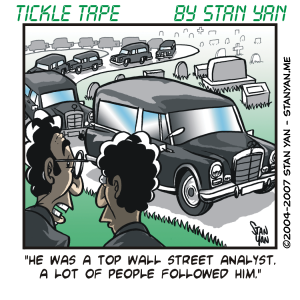Seasoned traders warn, “Be sceptical of everything you hear as a trader.” It is advice worth listening to. There are many so-called trading experts who claim they are on your side, but they are often out to sell you a trading system or methods that may not work. We all have a natural inclination to seek out profits, and there are plenty of people out there ready to take advantage of this inclination with promises of the “Holy Grail” of trading or trading methods that can help you get rich quickly.
The mix of valid and invalid information about trading is what makes trading tough. If you stay around trading long enough, you’ll hear the same stories of how, early in their careers, seasoned traders latched onto a so-called trading “guru” only to find that his or her methods were obsolete or just didn’t produce a profit. In our Innerworth interviews with master traders, for example, we found many traders who were profitable before 2000 who haven’t traded profitably since. This observation illustrates how a method that may have worked under certain market conditions may not work under others. That is why you must always be on the lookout for what works and what doesn’t.
To a novice trader, this can be quite confusing. Trading is quite different from other occupations where you can just go to a few leading experts, learn their techniques and principles and achieve success. You can do that with trading, but it is difficult. For example, you can read books like “Market Wizards” or “Trading in the Zone” in order to learn some basic trading principles, but even these basic principles as described in these books may be restricted to a specific context and a specific set of circumstances. But you must start somewhere. It will be hard to learn to trade without any reference points at all.
Sometimes it is useful to learn information that is slight “wrong” in order to use it as a foundation. Consider how you learned basic subjects in schools, such as reading, writing, and math. A teacher initially tried to simplify information so that students could learn it. Young children don’t immediately start reading Shakespeare. They start out with basic readers with simple words. Similarly, you can’t start out doing calculus. You must first go through the steps of learning basic math and algebra. With these basic building blocks as a foundation, you can move up to calculus.
You can take a similar approach to trade. Much of what you read in trading books will be a little wrong and a little right. When you read a case study about market action, for example, it may be fixed in a specific time and context. In the markets, history only repeats itself when it does. The rest of the time, it does not. But you have to start someplace. You have to start somewhere and get an initial feel for the markets. Some newbie traders have found solace, for example, in using Elliot Wave Theory.
There are times when markets behave in repetitive cycles and times when they don’t, but it is useful when you start trading to assume that they do and see how far you can go. Over time, you’ll learn under what conditions a method works and when it does not. You’ve got to learn to walk before you can run, and there are times when it is useful to try out simple methods until you gain enough experience to trade with confidence. Once you learn the rules, you can learn when they are wrong, and when to break them. There are other rules that you would be smart to learn before you break them.
It is useful to limit your risk on a single trade, for example. But seasoned traders often break this rule. Similarly, the conventional wisdom followed by many is to stay out of the markets when an unexpected adverse event may occur, such as an interest rate hike, but some seasoned traders try to capitalize on the news of such events. Trading is a difficult, challenging business. Unlike many other professions, conventional trading wisdom is only right when it is. Over time, and after you accumulate a wealth of experience, you’ll learn which “rules” to follow and which ones to break.


